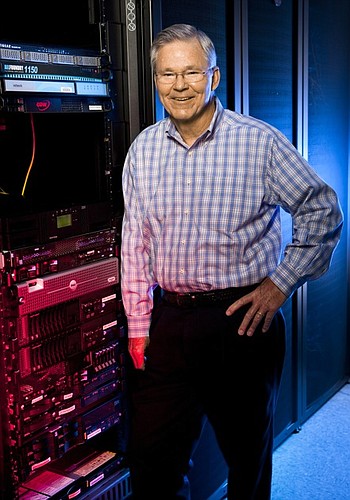- November 26, 2024
-
-
Loading

Loading

Being a long-haul trucker involves more than all-night drives, weigh stations, strong coffee and watching out for state troopers.
Drivers must keep up with tremendous amounts of paperwork documenting delivery of durable goods or perishable items, and those invoices make all the difference in getting paid sooner rather than later.
All that paper is the domain of Pegasus TransTech Corp., a Tampa-based company that helps transportation companies process documents more rapidly by operating scanning stations at truck stops. The company's patented TransFlo system connects quickly to accounting offices, speeding up billing and payroll cycles and carrier cash flow.
Ideally, the system helps truckers get paid more quickly than having to stuff work sheets, manifests and invoices into an envelope and drop them off at the nearest post office. With electronic scanning, payments that used to take up to two weeks to collect can be settled in a matter of minutes, or no longer than four hours guaranteed.
Introduced in 2002, TransFlo Express scanners are now available at 800 truck stops nationwide, with more growth expected as availability expands into Canada. Pegasus TransTech also offers software (dubbed TransFlo Now!) that allows drivers to scan papers at home or in the cabs of their tractor-trailers, using a laptop computer with a wireless online connection.
“Our primary business is helping companies go paperless,” says Bob Helms, chairman and CEO of Pegasus TransTech. “Our ultimate goal is low touch or no touch.”
Placing the TransFlo scanners at modern truck stops is obvious, since drivers of 18-wheelers ultimately stop there anyway to fuel up their rigs, get meals or clean up. As the system works now, a trucker hands the necessary paperwork over to a trained cashier who can handle scanning and sending, and can look up documents online afterward.
“It's a universal distribution point that is convenient to the driver world,” Helms says. “People have asked me why they couldn't go to Kinko's to do the same thing, but there's no place to park a truck at Kinko's.”
He adds that TransFlo was the first to go to market with its trucking paperwork scanning technology and is the industry leader in electronic document delivery for trucking companies, with 27 of the top 35 truckload carriers using Pegasus TransTech's products and services. Some of those names are familiar to anyone on the interstates: Heartland Express, CSX Intermodal, Crete, Swift and J.B. Hunt, to name a few.
Pegasus TransTech was founded in 1991 as a division of Pegasus Imaging Corp., also based in Tampa. The document imaging division was spun off in 1998 to focus on solutions for the transportation industry, with Helms joining the following year.
Response to the TransFlo system has been strong, according to Helms, who notes that his company now has 10-year exclusive agreements with three of the nation's top truck stop chains. He points to various endorsements from prominent carriers.
“When I saw this technology open up to the point where we could leverage it on the road, it opened my eyes to the impact we could have on our business performance,” says John Cosaert, CFO of Heartland Express Inc. in North Liberty, Iowa. “Allowing our drivers to transmit their paperwork at the truck stop while they're fueling has really changed our work flow as an organization.”
Redundancy is a key to security of documents scanned in over the TransFlo system, Helms emphasizes. Two copies each are stored at Pegasus TransTech's primary data center, inside the company headquarters at Corporate Center Four at International Plaza, and two backup data centers in Minneapolis and Madison, Wis.
“We've never lost a document,” Helms says. “You can imagine if you lose any one of them, you're going to have an angry employee or an angry CFO.”
The company's data center is far more advanced than what it started out as — “a used desk with three PCs on it,” he adds.
Although the privately held company declines to disclose figures, Pegasus TransTech claims double-digit revenue growth in each of the last eight years since TransFlo was introduced. Helms says the company, which has 45 employees, anticipates further growth as more goods are transported in boxes and tanks along North America's highways.
With more than 250,000 drivers now using TransFlo, and the prospect of being able to process paperwork literally from behind the wheel, he says the company's future is an open road.
“It's got to be easy to install, use, upgrade and get serviced,” he says. “We want to make it simple for everybody.”